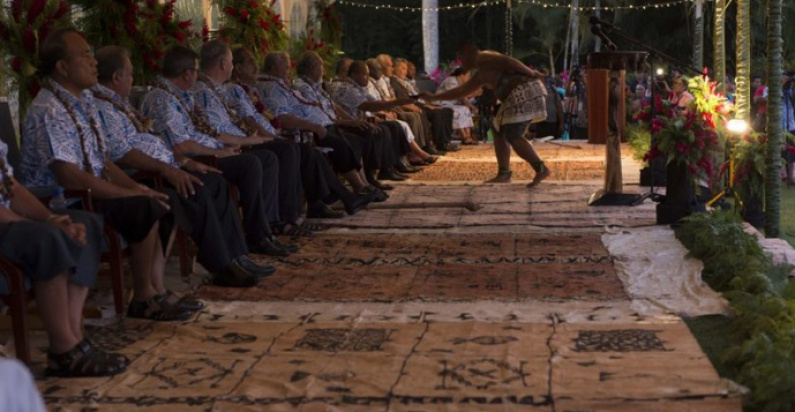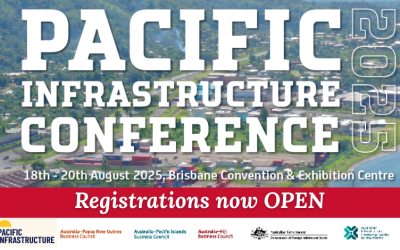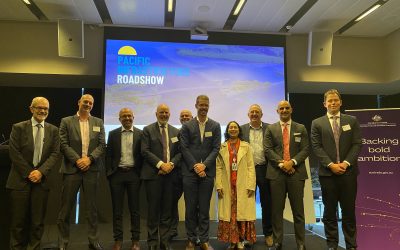By Tess Newton Cain, Matthew Dornan (Devpolicy)
Last week the 48th Pacific Islands Forum Leaders meeting was held in Apia, Samoa. The meeting’s theme, the ‘Blue Pacific’, was unsurprising given this year’s focus on oceans. But it was interesting nonetheless, given the increasing use of terms like the ‘blue economy’ (PIDF) or ‘blue Pacific’ (PIFS) to define Pacific regionalism – much as the ‘Pacific Way’ was used in the past.
This year was the first since the establishment of the Framework for Pacific Regionalism not to include a process through which the public are invited to make submissions on what leaders should discuss. That process, which sees proposals assessed by a Specialist Sub Committee on Regionalism (the SSCR), was never intended to occur every year. Its absence this year might therefore be explained in terms of needing to take stock of issues raised previously. Except, many issues identified through the process previously, and which we would expect to see followed up, have seemingly been set aside. They are cervical cancer, ICT, and improved business processes for the private sector.
Another likely explanation for the absence of a public submission process is political. The public consultation process in previous years has raised contentious issues time and time again. Last year, 13 of 48 submissions concerned West Papua – much to the dissatisfaction of the Australian, New Zealand, and Papua New Guinean governments. This year, in contrast, discussion of West Papua was limited to one un-critical line in the Forum Communiqué.
Climate change was still prominent, but in terms agreeable to all. Well, almost all. The Prime Minister of Tuvalu, Enele Sopoaga, vented his frustration after the Forum – both at its failure to endorse Tuvalu’s proposal for climate change insurance, and at its focus on issues not directly relevant to the Forum members, such as North Korea: “The Forum is supposed to discuss issues from its members and small island states… Why should they come to a Forum that only supports political wishes of the big countries?”
Notwithstanding this outburst, the Forum Leaders meeting this year did feature less outright disagreement than in previous years. The host, Samoa, can take some credit for this. The event appears to have been carefully managed, with the selection of a unifying theme and avoidance of unresolvable issues. The influence of foreign ministers may also have played a part. We suggested last year that the foreign ministers were where the real power lay in terms of what was on the agenda for the leaders. This year would appear to add credence that argument – and now their meeting is one of two to be given a ministerial charter, in line with the recommendations of the 2016 review of Forum regional meetings.
Unsurprisingly, issues of security were very prominent during the leaders’ discussions. Further to the deliberations of the Forum foreign ministers, the nomenclature of ‘Biketawa Plus’ appears in the communiqué. Leaders have tasked the Pacific Islands Forum Secretariat to undertake a series of consultations with a view to presenting a ‘Biketawa Plus’ document for consideration in 2018.
Whilst it is too early to predict the precise detail of what such a thing would contain, the context in which it is discussed in the communiqué raises some concerns. The result of these consultations is expected to be a:
“foundation for strategic future regional responses recognising the importance of an expanded concept of security inclusive of human security, humanitarian assistance, prioritising environmental security, and regional cooperation in building resilience to disasters and climate change.”
Here, it is what is not said that is more important than what is. The current Biketawa declaration states very clearly that Forum members are committed to democracy, good governance, the protection of human rights and the maintenance of the rule of law. The communiqué does not refer to any of these items in its vision for ‘Biketawa Plus’. It is to be hoped that this means they will be preserved and restated robustly rather than left by the wayside.
The most noteworthy reference to human rights in this communiqué is the support that the Pacific Islands Forum has given to the candidature of both Fiji and Australia to the United Nations Council on Human Rights. Whilst it is hard to imagine leaders actively opposing these nominations, one has to wonder whether there were any misgivings (voiced or otherwise) given human rights concerns raised in relation to both Fiji and Australia.
Several other interesting things happened at and around the Forum meeting. Australia announced a Pacific labour scheme which, for the time being, will be open to citizens of Nauru, Kiribati and Tuvalu. Vanuatu signed up to PACER Plus after months of reluctance, though in doing so it identified visa free access to Australia as an issue to be discussed, whether bilaterally or regionally. And PNG announced that it will provide visa-fee free access to citizens of all Pacific Island Forum member nations (we assume this includes Australia, which of course has been criticised by PNG for its visa regime).



